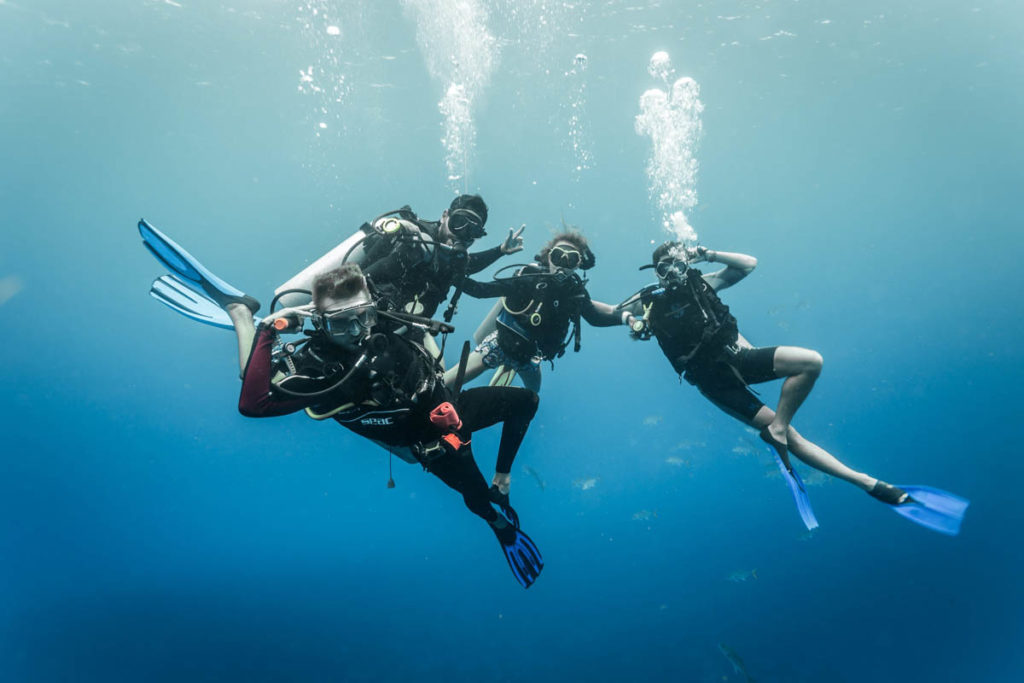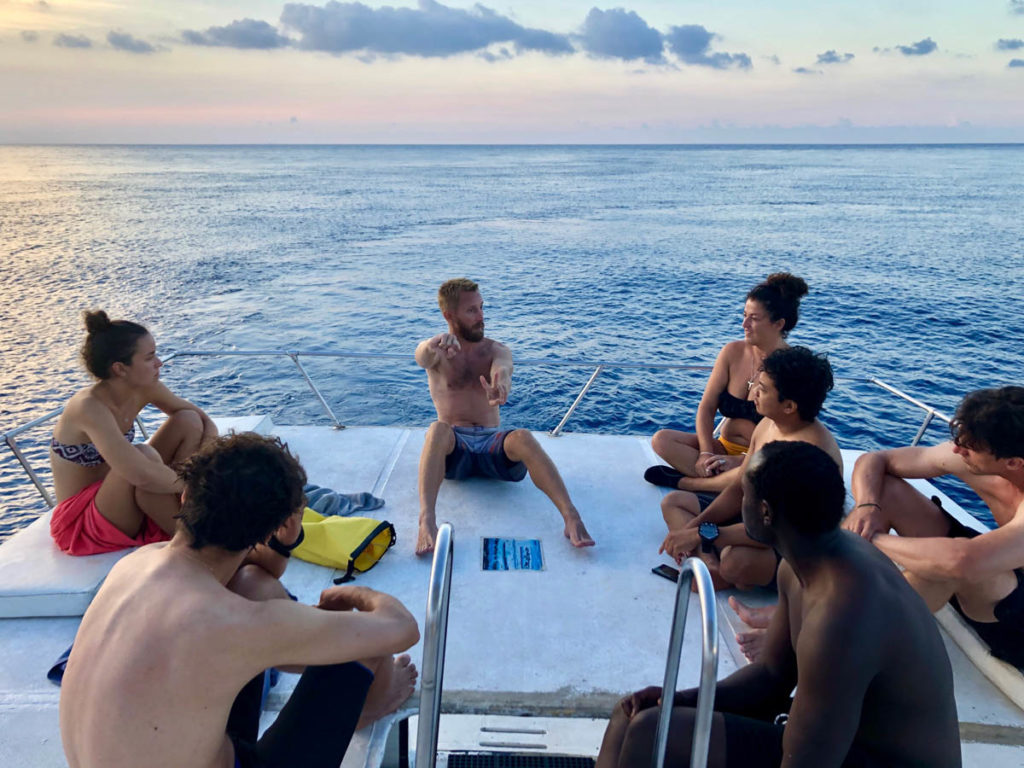No matter which agency you decide to learn to dive with, as long as it can be associated to shops and schools, there will be a Divemaster (DM) or equivalent role. A DM is responsible for assisting instructors and helping the flow of a dive business, both from the point of view of customer satisfaction, logistics and safety. A busy operation will often have a number of DMs on hand to provide assistance with anything from filling cylinders on the compressor to accompanying rescue divers during their open water training, alongside an instructor. DM or it’s equal is the first professional qualification that can be taken within many of the for-profit agencies, so it is generally looked upon as the first step a serious diver might take on the path to becoming an Instructor. However, I am a firm believer that completing ones DM training greatly increases a diver’s skill and grows them immensely as an individual, even if they have no intention to go onto instructing.

The first major plus side of completing a DM qualification, is that it in most cases, it places you in customer facing role. Whether this is directly dealing with customers that may be wishing to book onto dives with your shop, or simply being present during courses and fun dives as an assistant, you will be interacting with people you have only just met very regularly. As anyone who has spent much diving will know, this can get quite personal when it comes to helping customers with picking out and adjusting gear from your rental suits and BCDs. During busy times, this comes with the added challenge of having to be both efficient with your time while still polite and helpful, especially in areas where you may be on a time constraint due to tides or weather conditions. You’ll become very good at estimating people’s boot, suit, fin and BCD sizes at a glance, it’s a necessity! In my personal situation, this was a huge learning curve for me, as I had never worked in a customer facing role such as this before. That said, those who have spent time working in retail or hospitality may not find this to be a challenge at all. By the end of my DM training, it is safe to say that any hesitance or shyness I had about dealing with strangers had evaporated.
Leading on from the last point, is that being a DM in a customer fuelled environment forces you to keep a schedule which you can willingly adapt. How this is done will vary depending on where you decide to train, if you are the lone trainee as I was then you alone need to adaptable and accountable. At a larger operation, you may have a rotor of who gets a lie in versus who needs to start filling cylinders and prepping customer gear for the day ahead. How busy your week is customer wise will almost certainly impact how much time you will spend prepping for the following day. For example, if you have a group of ten divers who are wanting to do two dives a day for a week, you know you need to have twenty cylinders filled for them alone every day, plus those for the instructors and DMs that may be guiding them. This in itself may be fairly manageable. But then midweek, that group decide they want to go night diving. It’s July and you’re working at a dive shop in the Canary Islands, where it isn’t getting dark until around 9pm. By the time they are back from the night dive you have twelve cylinders which need to be refilled before the day of diving tomorrow. You can’t run the compressor at night because your shop is near residences, so you accept you will need to open the shop an hour earlier tomorrow in order to have the cylinders filled in time. Looks like you’ll have to decline the customers offers to buy you a beer at the bar up the street and get an earlier night. Small sacrifices like this are part and parcel of being a DM, you are there to help with smooth running of the shop after all. Being able to be both flexible and reliable as a DM are great traits to carry on into any other career, as well as wider diving.

Being in a dive shop most days of the week will also quickly increase your awareness of equipment in a variety of senses. You’ll become very familiar with the gear which your shop stocks and rents out, as you’ll be handling it and possibly setting it up near constantly. Seeing how gear that should be properly maintained functions will quickly let you spot problems with gear that may be starting to wear down, or in customers gear that clearly isn’t being maintained properly. You can see some interesting solutions that over attached customers may have taken to keep their gear running, ranging from innovative to hazardous. A cable tie used to replace a tab on a wetsuit zipper is fair enough. A loose inflator hose button held in place with bungee cord, and perhaps you ought to suggest the diver borrows a shop BCD. Most DM courses should include a section on equipment maintenance and spotting the tell-tale signs of wear. Spotting these problems and correctly identifying gear for maintenance is important from both a customer safety and legal standpoint. A minor problem at the surface can quickly become a major hazard as equipment is taken to depth.
Finally, and perhaps most importantly, DM training will fine tune your diving and take you to a level where you should be ready to go onto instructing (if you wish to). A course director once told me that in theory, the only difference between a DM and Instructor, is that the DM can’t teach everything yet. In terms of skills, they should be nearly identical in the water. Any holes in your own diving skillset will be quickly identified and improved, DM courses have assessments designed to test everything you should have learned up to that point. This isn’t just about the actual motor skills of diving, but also regarding situational awareness and foresight. Being able to adequately dive themselves should be a given for DMs at the end of their training, but what will set apart a good DM is the ability to read how other divers are behaving and how this might lead to an incident. This is mentioned in other courses such as PADI rescue diver and BSAC sports diver, but oftentimes, an attentive DM, instructor, or even buddy, should be able to spot the warning signs that someone isn’t comfortable on a dive. Being able to check-in with a diver and reassure them is an important part of being a DM, doing this is especially true for less experienced divers and for divers who you know have been out of the water for a while. When leading dives, habitually checking your customers should be second nature, they should not have to fight to get your attention. This is a great mindset to have in all diving, an attentive buddy in recreational diving or team member in technical diving goes a long way in making a dive more enjoyable. Attentiveness not only keeps you on top of your group’s problems, but your own situation to, by encouraging you to be aware of your own comfort levels and constraints.
For all the reasons here, and many more, I really believe that a DM qualification is something that anyone who is serious about diving should consider completing at some point. The personal growth that I saw from my own DM course helped me in the non-diving jobs that I then had afterwards. It also totally changed how I behaved on recreational dives, in terms of being much more hazard aware and far more people aware of what was going on in my dive group around me. It gave me a better understanding and empathy for the way a dive operation is run, and the countless hours that are put in behind the scenes to ensure that customers have the best experience possible. Unknowingly, spending time around instructors in a fun, outdoor routine also planted the seed that would eventually lead to me returning to professional qualifications three years later, to become an instructor myself. I heartily encourage anyone that’s ever wondered about doing a DM course to do their research and do so. At the time, mine was the best three months I’d ever had.





